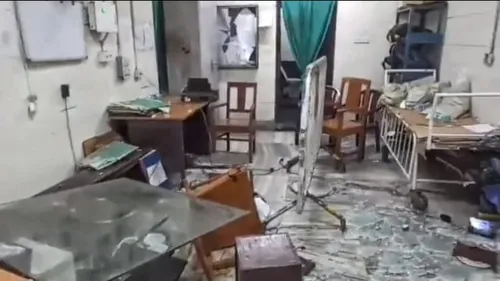Context and Incident Overview
The recent ransacking incident at RG Kar Medical College in Kolkata has stirred significant controversy in West Bengal. The medical institution, known for its academic excellence, found itself at the center of chaos when a group of individuals vandalized its premises. The incident, which caused considerable damage and panic, prompted widespread reactions from various political and social circles.
Table of Contents
Chief Minister’s Response
West Bengal Chief Minister Mamata Banerjee quickly addressed the situation, taking a firm stance on the issue. In her statement, she offered a clear defense of the medical professionals involved, asserting that they had no role in the unfortunate events. Instead, she directed her criticism toward the opposition parties, accusing them of inciting violence and attempting to destabilize the state.
Opposition’s Allegations
The opposition, however, has presented a different narrative. They have accused the state government of negligence and have questioned the security arrangements at the medical college. According to them, the incident was a result of the administration’s failure to maintain law and order, and they have demanded an independent inquiry into the matter.
The opposition’s allegations also extend to the broader context of governance in West Bengal. They argue that the state government has been ineffective in handling such incidents, leading to a growing sense of insecurity among the public. Their criticism is part of a larger political strategy aimed at challenging the ruling party’s credibility ahead of the upcoming elections.
Political Implications
The ransacking incident and the subsequent political exchanges have far-reaching implications for the state’s political landscape. For the ruling party, maintaining public confidence is crucial, especially in the face of mounting challenges from the opposition. The Chief Minister’s defense of the doctors and her accusation against the opposition can be seen as an effort to solidify her party’s position as the protector of public interests.
On the other hand, the opposition’s approach reflects their attempt to capitalize on the incident by portraying the ruling party as incapable of ensuring public safety. Their demand for an inquiry is not just about uncovering the truth behind the incident but also about creating a narrative of governmental failure.
The Role of Media
The media has played a significant role in shaping public perception of the incident. Various news outlets have covered the event from different angles, often reflecting the political leanings of their audiences. Some have focused on the Chief Minister’s defense of the doctors, highlighting her commitment to protecting public servants. Others have emphasized the opposition’s allegations, questioning the effectiveness of the state’s administration.
The media’s portrayal of the incident has also influenced public opinion, with many citizens taking sides based on the narratives they are exposed to. The polarized coverage underscores the broader political divide in the state, where media outlets are often seen as extensions of political factions.
Public Reaction
Public reaction to the incident has been mixed. On one hand, there is widespread support for the medical professionals, who are seen as frontline workers dedicated to saving lives. The Chief Minister’s defense of the doctors resonates with those who believe that healthcare workers should not be scapegoated for the actions of others.
On the other hand, there is concern about the increasing frequency of such incidents and what it means for the safety of public institutions. The opposition’s call for accountability has found support among those who feel that the state government needs to do more to protect its citizens and ensure that such incidents are not repeated.
Broader Implications for Healthcare
The ransacking of RG Kar Medical College has also brought to light the broader challenges facing the healthcare sector in West Bengal. The incident is a stark reminder of the vulnerability of medical institutions to external threats, which can disrupt their functioning and compromise patient care. It raises important questions about the security measures in place at healthcare facilities and the need for better protection for medical professionals.
Furthermore, the incident has implications for the morale of healthcare workers, who are already under immense pressure due to the ongoing pandemic. Ensuring their safety and well-being is crucial not just for the smooth functioning of hospitals but also for the overall health of the population.
Moving Forward: The Need for Dialogue
In the aftermath of the incident, there is a clear need for dialogue between the state government, opposition parties, and other stakeholders. Addressing the underlying issues that led to the ransacking, including political tensions and security lapses, is essential for preventing similar incidents in the future.
The Chief Minister’s defense of the doctors is a step toward ensuring that healthcare professionals feel supported. However, it is equally important to address the concerns raised by the opposition and the public regarding security and governance. An open and transparent inquiry into the incident could help restore public confidence and ensure that all parties involved are held accountable.
Conclusion
The ransacking at RG Kar Medical College is more than just an isolated incident; it is a reflection of the broader political and social dynamics in West Bengal. The Chief Minister’s defense of the doctors and her criticism of the opposition highlight the complexities of governance in a politically charged environment. As the state moves forward, it will be important to balance the need for accountability with the need to protect and support those who are on the front lines of public service. Through constructive dialogue and a focus on solutions, it is possible to turn this challenging situation into an opportunity for positive change.








